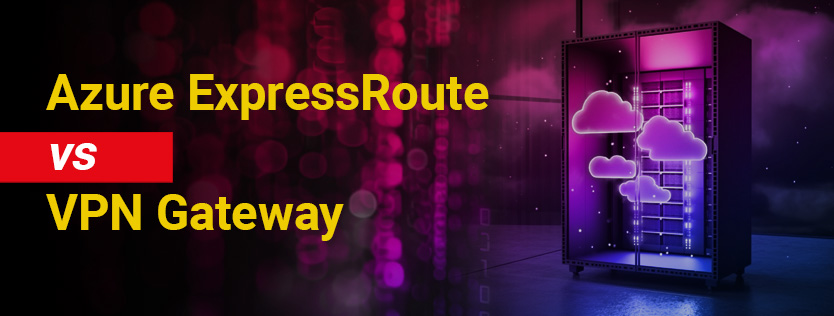Azure ExpressRoute vs. VPN Gateway
In this cloud computing era, connecting your on-premises network securely and efficiently to Azure cloud services is a critical consideration for any business. Microsoft offers two primary solutions for this purpose: Azure ExpressRoute and Azure VPN Gateway. Each comes with its own unique set of features, benefits, and considerations, making the choice between them dependent on your specific needs.

What is Azure ExpressRoute?
Azure ExpressRoute offers a direct and private connection to Microsoft Azure, bypassing the public internet entirely. This is achieved through a partnership with connectivity providers, allowing a dedicated connection from your on-premises network to Azure. ExpressRoute is particularly well-suited for large-scale, mission-critical applications that demand high levels of scalability and resilience. Some of the characteristics of ExpressRoute include:
- Utilizes layer 3 connectivity for a secure and direct network connection
- Connects your edge router to Azure with built-in redundancy to ensure continuous service
- Offers dynamic scalability, with bandwidth options ranging from 50 Mbps to 10 Gbps, catering to varying organizational needs
Benefits of ExpressRoute
Below are some of the benefits of ExpressRoute:
- High bandwidth availability, up to 10 Gbps, ensures your applications run smoothly without bandwidth constraints.
- Dynamic bandwidth scaling helps optimize costs, especially during periods of low demand.
- Backed by a 99.9% availability SLA, guaranteeing reliable connectivity.
Key Considerations for ExpressRoute
- The setup process for ExpressRoute is complex and requires coordination with your connectivity provider.
- Requires the installation of high-bandwidth routers on-premises.
- The connectivity provider is responsible for managing any changes or issues related to the circuit.
- Does not support Hot Standby Router Protocol (HSRP), necessitating a Border Gateway Protocol (BGP) configuration for redundancy.
Azure VPN Gateway
Azure VPN Gateway provides an encrypted tunnel for your data whenever users need secure public internet connectivity. It’s an ideal choice for lighter traffic or when the slight increase in latency is a trade-off worth making for cloud flexibility and power. Some of the key characteristics of Azure VPN Gateway include:
- It supports the Secure Socket Tunneling Protocol (SSTP) and IPsec protocols for secure data transmission.
- The gateway routing can be dynamic or static, depending on the needs.
Benefits of Azure VPN Gateway
Below are some of the benefits of Azure VPN Gateway:
- Easier to configure than ExpressRoute, making it accessible for businesses without extensive networking expertise.
- It offers significant bandwidth (up to 10 Gbps, depending on the SKU) and accommodates a wide range of data transmission needs.
Key Considerations for Azure VPN Gateway
- Requires a VPN device on your premises to establish connectivity.
- While Microsoft’s SLA guarantees 99.9% availability for the VPN Gateway itself, it does not cover the network connection to the gateway.
Azure ExpressRoute vs. Azure VPN Gateway: Key Differences
When comparing ExpressRoute and VPN Gateway, some of the key differences emerge as:
| Parameters | ExpressRoute | VPN Gateway |
| Azure Services Support | It supports a broader range of Microsoft services, including Azure, Office 365, and Dynamics 365 | It focuses primarily on Azure Cloud Services and Virtual Machines |
| Bandwidth | Offers up to 10 Gbps, or even 100 Gbps, with ExpressRoute Direct | Bandwidth capabilities up to 10 Gbps |
| Protocol and Routing | Uses direct connections over VLAN or MPLS and employs BGP for routing | Uses SSTP or IPsec for protocol and supports static or dynamic routing |
| High Availability and SLA | Offers an active-active configuration for higher availability, with a 99.95% SLA | Offers active-passive or active-active configurations, with SLAs ranging from 99.9% to 99.95% |
| Configuration and Cost | Requires a more complex setup and is generally more expensive due to the direct, private connection it provides | Simpler to configure and more cost-effective |
When deciding between ExpressRoute and VPN Gateway, it’s crucial to consider your organization’s specific needs. ExpressRoute is particularly well-suited for organizations that require high-speed, low-latency connections with a strong emphasis on availability and resilience. It’s the ideal choice for handling mission-critical workloads and accessing a comprehensive suite of Azure services, making it less suitable for smaller satellite offices with modest connectivity needs.
On the other hand, VPN Gateway serves as an excellent option for scenarios such as prototyping, development, testing, and managing small production workloads. It’s tailored for small organizations or connecting individual devices to Azure networks, where lower-speed bandwidth suffices for everyday operations. However, it’s important to note that VPN Gateway is not designed to support high-volume data transfers, marking a clear distinction in use cases between the two services.
Microsoft Azure with InfosecTrain
ExpressRoute and VPN Gateway stand as pivotal features within Azure cloud services, offering unique pathways for connectivity and security in the cloud. Delving into these technologies, InfosecTrain offers an Azure Administrator and Security combo training course that thoroughly explores managing and securing Azure environments. Perfect for IT professionals eager to advance their careers, this training improves your knowledge and positions you as an in-demand Azure expert. Enroll now with InfosecTrain and transform your understanding of cloud connectivity and security.

 1800-843-7890 (India)
1800-843-7890 (India)